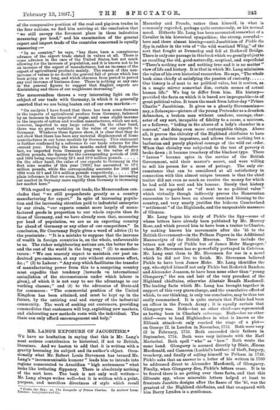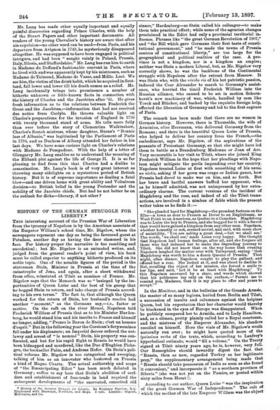MR. LANG'S EXPOSURE OF JACOBITISM.*
WE have no hesitation in saying that this is Mr. Lang's most serious contribution to historical, if not to British, literature. And we hasten to add that it is written with a gravity becoming its subject and its author's object. Occa- sionally what Mr. Robert Louis Stevenson has termed Mr. Lang's "incommunicable humour" leads him to intrude into regions consecrated to Arnoldian "high seriousness" what looks like irritating flippancy. There is absolutely nothing of the sort here. The book is not only well written— Mr. Lang always writes well—but it is written with a point, purpose, and merciless directness of style which recall • Pickle the Spy ; or. The Incognito of Prince Charles. By Andrew Lang. London : Long mans and Co. Macaulay and Froude, rather than himself, in what is commonly regarded, perhaps quite erroneously, as his normal
mood. Hitherto Mr. Lang has been accounted somewhat of a Cavalier in hie. historical sympathies ; the strong, scornful— here and there almost hissing—anti-Jacobitism of Pickle the Spy herather in the vein of "the wild westland Whig," of the sort that fought at Drumelog and fell at Bothwell Bridge. There is only one passage in this book which we greatly objeat to as recalling the old, good-naturedly, sceptical, and superficial "There's nothing new and nothing true and it is no matter" view of life and history. It is that in which Mr. Lang minimises the value of his own historical researches. He says, "The whole book aims chiefly at satisfying the passion of cariosity Our history is of next to no political value, but it revives, as in a magic mirror somewhat dim, certain scenes of actual human life." We beg to differ from him. His history— provided the facts on which it is based are impregnable—is of great political value. It tears the mask from latter-day "Prince Charlie" Jacobitism. It gives us a ghastly Stevensonian- nay, a Zolaesque—picture of the young Pretender as a drunken debanchee, a broken man without candour, courage, char- acter of any sort, incapable of fidelity to a cause, a mistress, or a follower, "hiding in the alcove of a lady's chamber in a convent," and doing even more contemptible things. Above all, it proves the chivalry of the Highland chieftains to have been an absolute imposture, and allows them nothing but a, barbarian and purely physical courage of the wild cat order.
When that chivalry was subjected to the test of poverty it broke down ; it became treachery of the blackest type. These " heroes " became spies in the service of the British Government, sold their master's secret, and were willing to sell his person for a mess of pottage. The only cir- cumstance that can be considered at all satisfactory in connection with this almost unique treason is that the chief traitor did not even so much as receive the money for which he had sold his soul and his honour. Surely that history cannot be regarded as "of next to no political value" which virtually though indirectly proves the Hanoverian succession to have been an almost unmixed blessing to the country, and very nearly justifies the hideous Cumberland " settlement " of the Highlands, and the unspeakable massacre of Glencoe.
Mr. Lang began his study of Pickle the Spy—some of whose letters have already been published by Mr. Murray Rose, and which proved him to have been a traitor to Charles, by making known his movements after the '45 to the British Government—in the Pelham Papers in the Additional Manuscripts of the British Museum. These include the letters not only of Pickle but of James Mohr Macgregor,' whom Mr. Stevenson has so powerfully portrayed in Catriona. Mr. Lang sent them to Mr. Stevenson for use in a novel which he did not live to finish. Mr. Stevenson believed Pickle to have been James Mohr. Mr. Lang identifies the spy, who styled himself not only Pickle but Roderick Random and Alexander Jeanson, to have been none other than " young Glengarry," the son and heir of the very proudest of the Highland chieftains, otherwise Alastair Ruadh Macdonell.
The leading facts which Mr. Lang has brought together in support of this very grave charge, and the cumulative effect of which, to our thinking, is only too conclusive, may be thus too easily summarised. It is quite certain that Pickle had been an officer in the French Army ; it is equally certain that Glengarry was. Both—but no other chief—are represented as having been in Charles's entourage. Both—but no other chief—were to head Highlanders in what is known as the
Elibank attack—it only reached the stage of a plot— on George II. in London in November, 1752. Both were very
ill in February, 1753. Both succeeded their fathers in September, 1754. Both were very intimate with the Earl Marischal. Both spell " who " as "how." Both wrote the same hand. Glengarry is accused directly by Blair, 2Eneaa Macdonald, and Cameron (Lochiel's brother) of theft, forgery, treachery, and finally of selling himself to Pelham in 1749.
Pickle asks that an answer to a letter of his written in 176G be addressed direct to Alexander Macdonell, of Glengarry. Finally, when Glengarry dies, Pickle's letters cease. It is to be feared there is no getting over these facts, and that this illiterate spy, whose miserable letters helped at least to frustrate Jacobite designs after the fiasco of the '45, was the greatest of the Highland chieftains, and that compared with him Barry Lyndon is a gentleman. Mr. Lang has made other equally important and equally painful discoveries regarding Prince Charles, with the help of the Stuart Papers and other important documents. All readers of the young Chevalier's history are aware that after nis expulsion—no other word can be used—from Paris, and his departure from Avignon in 1749, he mysteriously disappeared altogether. He was supposed to have been engaged in political intrigues, and had been "sought vainly in Poland, Prussia, Italy, Silesia, and Staffordshire." Mr. Lang has ran him to earth in Madame du Deffand's fashionable convent in Paris, where he lived with and was apparently kept by his mistresses, such as Madame de Talmond, Madame de Vasse, and Mdlle. Luci. We see him, the victim of the drink habit, which he acquired in Scot- land, fall lower and lower till his death comes as a relief. Mr. Lang incidentally brings into prominence a number of hitherto unknown or little-known facts in connection with the history of Charles and the Jacobites after '45. He gives fresh information as to the relations between Frederick the Great and the Jacobites,—information that had not received due notice from Carlyle. He throws valuable light on Charles's preparations for the invasion of England in 1750 with twenty thousand stand of arms. He tells more fully than ever before the story of Clementina Walkinshaw, Charles's Scotch mistress, whose daughter, Burns's "Bonnie lass of Albanie," was legitimised by the Parliament of Paris in 1784, and as Duchess of Albany attended her father in his last days. We have some curious light on Charles's relations with Madame de Pompadour. With the help of a letter of Glengarry Mr. Lang enables us to understand the meaning of the Elibank plot against the life of George II. It is so far ,pleasing to find from this that Charles had a dislike to assassination. Mr. Lang's book is of very great interest as throwing many sidelights on a mysterious period of British history. But it is of supreme importance as dealing a fatal blow—and one driven home with great ability and Voltaire= decision—to British belief in the young Pretender and the nobility of the Jacobite chiefs. But had he not better be on the outlook for dirks—literary, if not other



































 Previous page
Previous page